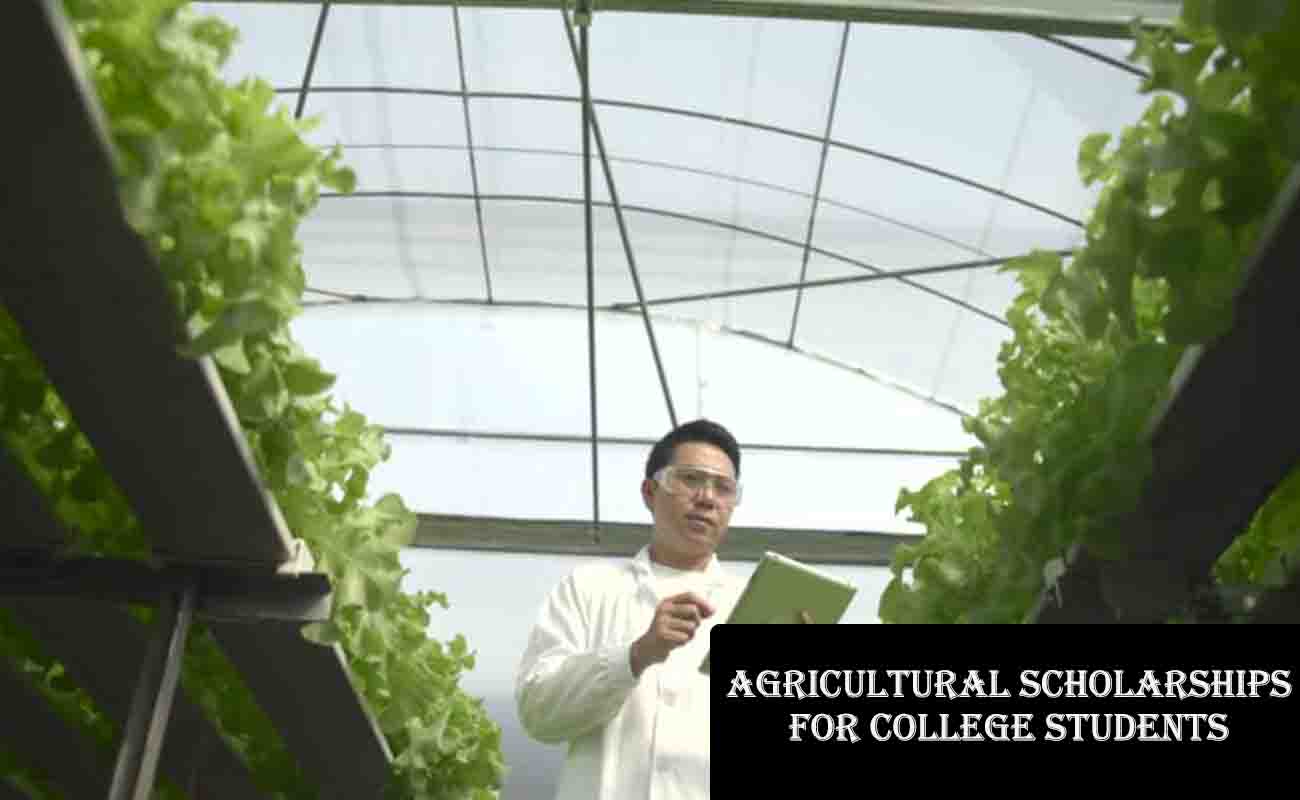In this post, I will share some Agricultural Scholarships for College Students. Agriculture is the backbone of our world, feeding billions and shaping sustainable futures. As the global population grows, the need for skilled professionals in fields like agronomy, food science, and agricultural economics is bigger than ever.

If you’re passionate about this industry, a college degree is a great way to turn that passion into a career. But let’s face it, college costs can add up quickly. That’s where agricultural scholarships for college students come in, offering financial support to help you focus on your studies without worrying about the price tag.
In this article, I’ll walk you through the ins and outs of these scholarships. We’ll explore the different types available, who can apply, how to navigate the application process, and even answer some common questions you might have.
Whether you’re a high school senior or a current college student, there’s likely a scholarship out there for you. So, let’s dive in and find the opportunities that can help you grow your future in agriculture!
Key Points
- Variety of Scholarships: Agricultural scholarships for college students are available from universities, government agencies, private companies, and industry organizations, covering fields like agronomy, food science, and horticulture.
- Eligibility: Most require you to major in an agriculture-related field, with some needing a minimum GPA, financial need proof, or specific career goals.
- Application Process: Involves researching scholarships, gathering documents like transcripts and essays, and meeting deadlines, often in spring or early summer.
- Financial Support: Awards range from $500 to full tuition, helping reduce college costs without repayment.
- Accessible Resources: Websites like Scholarships.com and USDA.gov provide detailed scholarship listings and application guidance.
Why Agricultural Scholarships Matter
If you’re passionate about agriculture, you’re entering a field that’s crucial for feeding the world and sustaining our environment. But college can be pricey, and that’s where agricultural scholarships come in.
These scholarships are designed to support students like you, studying everything from crop science to animal husbandry, by easing the financial burden of higher education. I’ve explored the options, and I’m excited to share how you can find and apply for these opportunities.
Types of Agricultural Scholarships
Agricultural scholarships come in many forms, each designed to support students with different interests and backgrounds. Here’s a look at the main categories you’ll encounter:
- Institutional Scholarships: Many universities with strong agriculture programs offer scholarships for their students. For example, Purdue University provides over 100 scholarships for students in its College of Agriculture, with awards ranging from $1,000 to $5,000. Oregon State University and North Dakota State University also offer dozens of scholarships for fields like agricultural business management and plant pathology.
- Government-Funded Scholarships: The U.S. Department of Agriculture (USDA) is a major player, offering programs like the USDA/1890 National Scholars Program, which covers full tuition, fees, books, room, and board for students at historically black land-grant universities studying agriculture or related fields. The USDA 1994 Tribal Scholars Program supports students at tribal colleges, combining classroom study with paid internships.
- Industry-Specific Scholarships: These focus on specific agricultural sectors. The Lois Britt Memorial Pork Industry Scholarship, for instance, is for students in swine programs or four-year agriculture colleges who plan to work in the pork industry. The National Potato Council offers a $10,000 scholarship for graduate students researching potato-related topics.
- Private Company Scholarships: Companies like Annie’s Homegrown and Bayer Fund support students pursuing agriculture careers. Annie’s Homegrown offers scholarships for sustainable agriculture studies, while Bayer Fund’s program raises awareness of diverse career paths in agriculture.
- State and Local Scholarships: Many states and regions have their programs. The California Farm Bureau Scholarship awards $1,800 to $5,000 to students pursuing agricultural careers. Similarly, the York County Conservation District in Pennsylvania supports residents studying conservation-related fields like agriculture or environmental science.
| Scholarship Type | Examples | Award Range | Eligibility |
|---|---|---|---|
| Institutional | Purdue University, Oregon State University | $500–$5,000 | Enrolled in agriculture programs, often merit-based |
| Government-Funded | USDA/1890 National Scholars, USDA 1994 Tribal Scholars | Full tuition + fees | Specific institutions, agriculture majors |
| Industry-Specific | Lois Britt Memorial, National Potato Council | $1,000–$10,000 | Specific field focus (e.g., pork, potatoes) |
| Private Company | Annie’s Homegrown, Bayer Fund | Varies | Sustainable agriculture or career interest |
| State/Local | California Farm Bureau, York County Conservation | $500–$5,000 | Residency, agriculture-related majors |
No matter your focus—whether it’s sustainable farming or agricultural engineering—there’s likely a scholarship that fits your goals.
Eligibility Criteria
To qualify for agricultural scholarships, you’ll need to meet specific requirements, which vary by program. Here are the common criteria you’ll see:
- Field of Study: Most scholarships require you to major in an agriculture-related field, such as agronomy, crop and soil sciences, food sciences, horticulture, plant pathology, animal husbandry, or agricultural economics. For example, the National Holstein Women’s Scholarship targets students interested in dairy farming.
- Academic Performance: A minimum GPA is often required, typically around 2.5 or higher. The United Agribusiness League scholarships, for instance, require a 2.5 GPA, while others may ask for stronger academic records.
- Financial Need: Some scholarships, like those from the USDA or certain university programs, consider financial need. You may need to submit documents like tax returns or FAFSA forms to prove your need.
- Career Goals: Many scholarships require you to demonstrate your commitment to agriculture. The Lois Britt Memorial Pork Industry Scholarship, for example, requires applicants to plan a career in the pork industry and show leadership potential.
- Demographic or Geographic Requirements: Some scholarships are limited to specific groups or regions. The York County Conservation District scholarship is for Pennsylvania residents, while the Washington CattleWomen’s Beef Ambassador Scholarship targets Washington State students.
- Enrollment Status: Most scholarships are for current undergraduate or graduate students, but some, like the Agriculture Future of America (AFA) Scholarships, are open to graduating high school seniors planning to attend college.
Always read the fine print for each scholarship to ensure you meet all requirements before applying.
Application Processes
Applying for agricultural scholarships is manageable if you stay organized. Here’s a step-by-step guide to help you navigate the process:
- Research Opportunities: Start by exploring scholarship databases like Scholarships.com or CollegeScholarships.org. Your college’s financial aid office or agriculture department can also point you to internal scholarships.
- Check Deadlines: Deadlines vary, often falling in spring or early summer. For example, AFA Scholarships announces recipients in early June, while the National Potato Council’s scholarship typically has a March deadline.
- Gather Documents: Most applications require:
- A completed application form
- Academic transcripts or proof of GPA
- 2–3 letters of recommendation
- An essay or personal statement (often about your agricultural goals)
- Proof of financial need, if applicable
- Write a Compelling Essay: Your essay is your chance to shine. Explain why you’re passionate about agriculture and how the scholarship will help you achieve your dreams. Be authentic and specific—committees love personal stories.
- Submit on Time: Late applications are rarely accepted, so submit everything well before the deadline. Double-check that all materials are complete.
- Follow Up: If you don’t hear back within the expected timeframe, it’s okay to politely contact the scholarship provider for updates.
Pro Tip: Start your search early, even before your senior year of high school. Some scholarships require you to be enrolled in college, so planning gives you a head start.
Notable Organizations and Institutions
Several organizations and institutions stand out for their commitment to supporting agriculture students:
- Agriculture Future of America (AFA): Offers scholarships ranging from $1,600 to $3,200 for high school seniors and undergrads in agriculture or food-related programs. Recipients also get admission to the AFA Leaders Conference (www.agfuture.org/scholarships).
- USDA: Provides scholarships like the USDA/1890 National Scholars Program and USDA 1994 Tribal Scholars Program, covering full tuition and offering internships (www.usda.gov).
- Purdue University: Distributes over $1.5 million annually through more than 100 scholarships for agriculture students (ag.purdue.edu).
- National FFA Organization: Offers merit-based scholarships up to $5,000 for students with agriculture experience (www.ffa.org).
- California Farm Bureau: Awards $1,800 to $5,000 for students pursuing agricultural careers (www.cfbf.com).
- Annie’s Homegrown: Supports sustainable agriculture studies with scholarships (www.annies.com).
These are just a starting point—check local and regional organizations for more opportunities.
FAQs About Agricultural Scholarships
Here are answers to some common questions you might have:
- Are there scholarships specifically for agriculture students?
Absolutely! Colleges, national organizations, and local providers offer scholarships for agriculture majors. For example, the California Farm Bureau Scholarship provides $1,800 to $5,000 for students pursuing agriculture careers. - What do agricultural scholarships cover?
They typically cover tuition costs and sometimes fees, books, or living expenses. Unlike loans, they don’t require repayment if you meet the terms. - Who can apply?
Students majoring in fields like dairy farming, agronomy, food sciences, horticulture, or agricultural economics are eligible. Some scholarships require a minimum GPA, financial need, or an essay about your agricultural goals. - Are there general agriculture scholarships?
Yes, organizations like the National FFA offer merit-based awards for students with agriculture experience, regardless of their specific major. - How much does an agriculture degree cost?
Costs vary: around $6,872 per year at an in-state public college, up to $28,630 at an out-of-state private school. - What are some specific scholarships?
Here are a few:- National Holstein Women’s Scholarship: $1,000, deadline February 1
- Paulsen Family Scholarship Fund: $2,500, deadline March 12
- John M. Roca Memorial Scholarship: $5,000, deadline March 15
| Scholarship Name | Amount | Deadline |
|---|---|---|
| National Holstein Women’s | $1,000 | Feb 1 |
| Paulsen Family Scholarship | $2,500 | Mar 12 |
| John M. Roca Memorial | $5,000 | Mar 15 |
| Chester T. Dickerson, Sr. | $1,000 | Mar 15 |
Conclusion
Agricultural scholarships for college students are a game-changer, helping you pursue your passion for agriculture without the stress of overwhelming college costs. From university programs to government and industry initiatives, there’s a wide range of opportunities waiting for you.
I encourage you to start researching now, stay organized, and put your best foot forward in your applications. Your future in agriculture is bright, and these scholarships can help you get there.
